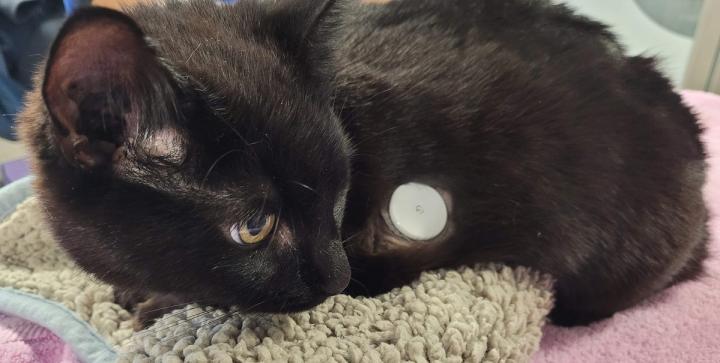Pet fitted with glucose monitor now in diabetic remission
Cat’s glucose levels successfully monitored using Bluetooth technology
A pet cat is now in diabetic remission after her glucose levels were successfully monitored by a glucose monitor, fitted by veterinary specialists at our Hospital for Small Animals.
Shadow, a 10-year-old black domestic short hair cat, developed diabetes due to her severe pancreatitis. After treatment by our Internal Medicine Service team, Shadow is on track to make a full recovery.
Emergency Referral

Shadow was recently referred to our Hospital by her vet. She presented as an emergency case and was in considerable distress, with free fluid in her chest and abdomen. Our Hospital’s Emergency and Critical Care team quickly stabilised her and diagnosed severe pancreatitis and vasculitis. Sadly, due to her pancreatitis, she also developed diabetes.
As well as treating her pancreatitis and vasculitis, Shadow’s diabetes needed to be closely monitored by our Internal Medicine Team. After consulting with her owners and primary vets, she was fitted with a permanent glucose-monitoring device ( FreeStyle Libre). This allowed Shadow’s owners to take her home and measure her glucose levels on their phone through a Bluetooth reader. The information about her blood glucose levels was then passed back to the Internal Medicine team who adjusted her insulin as required.
Excellent prognosis
Three months after being referred to the Hospital, Shadow’s pancreatitis has now subsided and she is in diabetic remission, with no more insulin requirements. Her free fluid is gone and she is no longer on diabetic diet. Shadow continues to recover at home and her glucose monitor has been removed. She does not need further rechecks with our Internal Medicine Service but will have regular assessments at her home vets.
These modern glucose monitors are invaluable when tracking an individual pet’s glucose levels in real time. It can be done by the owner at home with minimum stress to the patient. The detailed information they provide vets has vastly improved how we can monitor diabetic animals and treat them accurately with insulin. These devices increase the chances of cats successfully achieving diabetic remission and we are delighted that Shadow is doing so well.
About the Royal (Dick) School of Veterinary Studies
The Royal (Dick) School of Veterinary Studies is a one-of-a-kind centre of excellence in clinical activity, teaching and research. Our purpose-built campus, set against the backdrop of the beautiful Pentland Hills Regional Park, is home to more than eight hundred staff and almost fourteen hundred students, all of whom contribute to our exceptional community ethos.
The School comprises:
The Global Academy of Agriculture and Food Systems
The Hospital for Small Animals
The Jeanne Marchig International Centre for Animal Welfare Education
We represent the largest concentration of animal science-related expertise in Europe, impacting local, regional, national and international communities in terms of economic growth, the provision of clinical services and the advancement of scientific knowledge.

